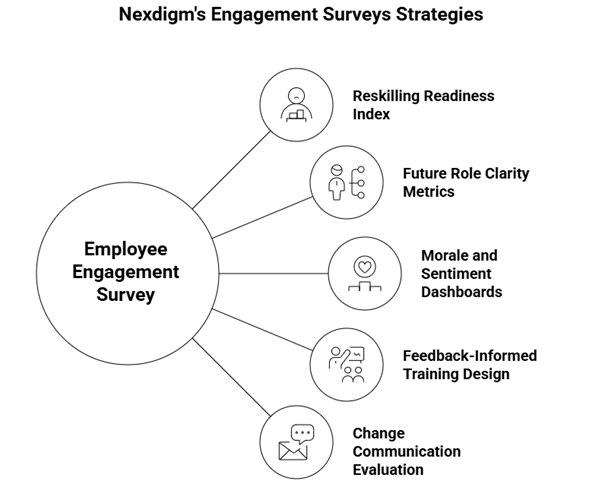As automation and modernization reshape the manufacturing and industrial landscape, organizations face a challenge of upgrading operations while retaining workforce confidence. While the business case for digital transformation is clear, its impact on employees is often underestimated. Concerns around job security, changing responsibilities, and the need for new skills can quietly erode morale, productivity, and trust.
Engagement surveys provide a structured, data-led approach to understanding workforce sentiment and aligning change efforts with employee readiness. When used proactively, they turn resistance into participation and uncertainty into clarity.
Understanding Workforce Concerns in Tech-Driven Transitions
During periods of automation, plant modernization, or digital integration, workforce apprehension is a critical signal. According to the Nexdigm survey, 50% of all employees will require reskilling by 2025, amplifying the need for structured communication and support. Employees across hierarchies may experience varying degrees of uncertainty, ranging from fear of redundancy to anxiety over evolving skill requirements. Key concerns often include:
- Job Security: A lack of clarity about role continuity can drive attrition, even before any formal restructuring begins.
- Skill Relevance: 53% of manufacturing workers feel unprepared for advanced digital tools.
- Communication Gaps: Poor communication is responsible for up to 70% of failed transformation initiatives
- Adaptability Fatigue: Repeated waves of change without support lead to resistance or passive non-compliance.
Without directly addressing these concerns, companies risk operational delays, dips in productivity, and morale-driven inefficiencies. Engagement surveys act as an important tool to surface these issues early before they affect transformation outcomes.
How Nexdigm’s Engagement Surveys Enable Change Resilience
Nexdigm design engagement surveys tailored to transitional environments, where automation, AI integration, or plant modernization can disrupt traditional roles and workflows. Our approach focuses on real-time sentiment capture and segmented diagnostics to ensure leaders can proactively respond to workforce challenges. Here’s how we enable industrial clients to manage change more effectively:

- Reskilling Readiness Index: We evaluate employee’s perceived preparedness and willingness to acquire new technical skills, with segmentation by age, department, and experience level.
- Future Role Clarity Metrics: Our surveys include items that assess how well employees understand their evolving responsibilities, helping identify areas where better communication is needed.
- Morale and Sentiment Dashboards: Pulse-based tracking reveals dips in motivation or morale during implementation phases, allowing for targeted interventions.
- Feedback-Informed Training Design: By mapping feedback patterns, we help L&D teams prioritize skill-building programs where the confidence gaps are most pronounced.
- Change Communication Evaluation: Survey modules also measure the effectiveness of internal change messaging, highlighting disconnects between leadership intent and frontline understanding.
These feedback loops are integrated into leadership reporting frameworks, so corrective actions are not only reactive but strategic and timely.
Nexdigm’s engagement surveys are designed to surface the insights that matter, employee satisfaction, employee readiness, training gaps, and trust in leadership through change.
Nexdigm case
Nexdigm supported a large manufacturing company in navigating multi-plant automation by identifying readiness gaps and enabling targeted communication and reskilling, resulting in smoother adoption and disruption-free rollout.
To take the next step, simply visit our Request a Consultation page and share your requirements with us.
Harsh Mittal
+91-8422857704

